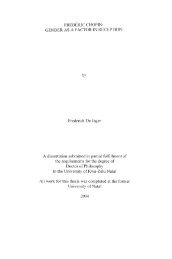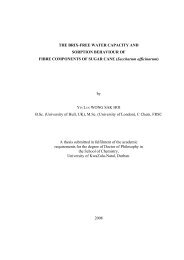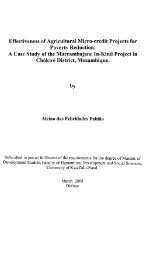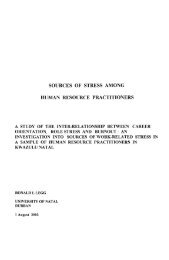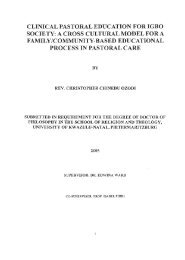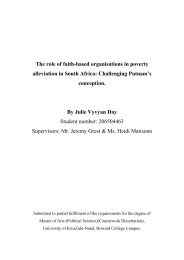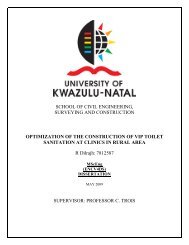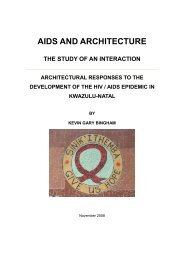View/Open - ResearchSpace - University of KwaZulu-Natal
View/Open - ResearchSpace - University of KwaZulu-Natal
View/Open - ResearchSpace - University of KwaZulu-Natal
Create successful ePaper yourself
Turn your PDF publications into a flip-book with our unique Google optimized e-Paper software.
1.3 Purpose <strong>of</strong> the Study and Research Questions<br />
The main objective <strong>of</strong> this study is to explore the experiences <strong>of</strong> home-based care<br />
coordinators/project managers as well as volunteer caregivers regarding infection control<br />
practices in home-based care for PLWHA. The findings <strong>of</strong> this study could assist policy<br />
makers in designing interventions aimed at addressing infection control in home based care<br />
organizations for HIV/AIDS patients. The key questions that this research intends to answer<br />
are:<br />
• What are the perceptions <strong>of</strong> infection control practices among home-based care<br />
coordinators/project managers and volunteer caregivers?<br />
• What resources are available for infection control practices?<br />
• How do volunteer caregivers practice infection control?<br />
• What challenges do volunteer caregivers confront regarding infection control<br />
practices and what strategies have been developed to deal with the challenges?<br />
1.4 Structure <strong>of</strong> the dissertation<br />
This dissertation is divided into six chapters. Chapter one: introduces the study. It provides<br />
relevant background information, outlines the research problem, states the purpose and<br />
objectives <strong>of</strong> the research, and summarises the significance <strong>of</strong> the study.<br />
Chapter two: reviews relevant literature to this study, presented according to the following<br />
themes: prevalence <strong>of</strong> HIV/AIDS, the impact <strong>of</strong> HIV/AIDS and the role <strong>of</strong> home based care<br />
in dealing with the HIV/AIDS pandemic. The roles and challenges faced by volunteer<br />
caregivers in home based care for people living with HIV/AIDS. The concept <strong>of</strong> ‘infection<br />
control practices’ with reference to its application in home based care setting is also<br />
discussed. The theoretical framework used to inform this study, namely Ecological Systems<br />
Theory (EST) is then introduced. The initial author <strong>of</strong> the EST and how the theory has been<br />
applied in different fields is discussed. Following this, a working definition <strong>of</strong> the theory is<br />
discussed. It then presents the levels <strong>of</strong> the theory as applied in the context <strong>of</strong> infection<br />
control practices in home based care organizations providing care to PLWHA in Durban<br />
Metropolis.<br />
5



